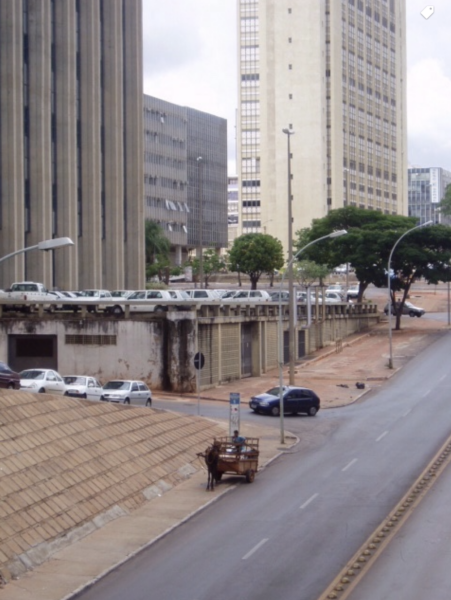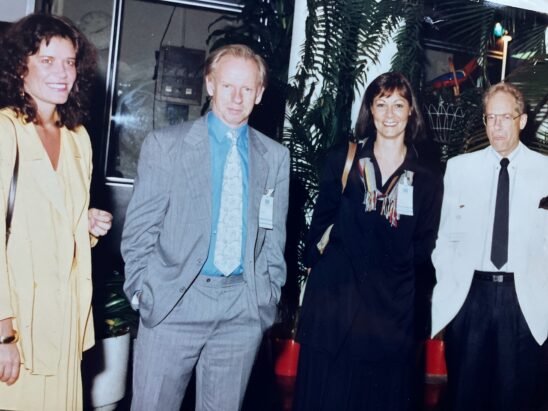
I am writing an autobiography, mainly for my family, but it does cover some key moments in the development of open and online learning. I thought I would share these as there seems to be a growing interest in the history of educational technology.
Note that these posts are NOT meant to be deeply researched historical accounts, but how I saw and encountered developments in my personal life. If you were around at the time of these developments and would like to offer comments or a different view, please use the comment box at the end of each post. (There is already a conversation track on my LinkedIn site and on X). A full list of the posts to date will be found toward the end of this post.
A major part of my responsibilities was to manage international consultancy contracts. Most of the international ‘marketing’ was done by Shannon Timmers, who spent a good deal of time on the road but he reported to Ian Mugridge, not me. I though would follow up and help implement international contracts, often funded through the Federal government’s Canadian International Development Agency (CIDA).
Universitas Terbuka, Indonesia
One major OLA project was assisting Universitas Terbuka (UT), the Open University of Indonesia, in developing a strategy for research. UT did not have its own central faculty, contracting in faculty from other universities to develop its courses, but it did have professional staff such as Deans and instructional designers, most of whom were in the early stages of their academic careers. Without tenure and research opportunities, it was difficult for UT to attract and retain high quality professional staff, so in 1991 I went out to Djakarta to help UT develop a strategy for research. I also attended and gave a keynote presentation at the Asian Association of Open Universities annual conference which was being held in Jakarta at the same time.
Djarkata is one of the largest cities in the world, and the traffic was horrendous. One day after work towards the end of my stay, I was sitting alone with a drink on a terrace in my hotel, facing an open square of grass in the centre of the hotel, when a huge thunderstorm burst. As the rain hit the grass, millions of insects rose up and took flight. My arms, legs and face were quickly covered with insects. On my flight home, I started sweating and feeling faint. By the time I got home, I was feeling really ill. I went to my local doctor, who immediately sent me to the university hospital to see a specialist, who took a blood sample. I had dengue fever, probably caused by a mosquito bite. I was told that there was no anti-viral treatment (I should have got shots before I went), and to go home and rest. I recovered in a couple of weeks, although for nearly a year afterwards I would occasionally get fatigue and the sweats.
Dominican Republic: radio for adult literacy
Before leaving the Open University, I had received an invitation to present at an international symposium in Santo Domingo on popular literacy by radio. The Catholic Church had been using radio to teach adult literacy directly through radio in several Latin American countries through a project called Radio ECCA.
When I arrived in Santo Domingo, I was shocked by the poverty on the ride from the airport to the conference hotel. My next surprise (although I should have known) was to find that nearly all the other conference participants were Catholic priests, in their cassocks.
I was even more surprised to be invited to join them in the bar at the end of the first day. When I entered the bar, I realised why. This had the only television in the hotel, and it was showing the soccer World Cup from Italy. The priests were from a number of different countries participating in the finals, and it was a sight to see the priests cheering, laughing and booing during the games. Not for the first time, I found football transcended national boundaries.
The ICDE in Venezuela
In November, 1990, I was back in Latin America to attend the ICDE World Conference in Caracas, Venezuela. First, though, I attended a pre-conference workshop organised by Michael Moore, my former colleague at the Open University, who was now the Director of the Centre for Distance Education at Penn State University. The workshop was held in a lovely hotel on the Caribbean coast of Venezuela about an hour north of Caracas. It was a popular spot for honeymooners. In the evening there was a Latin band playing music around the central swimming pool, and couples would come out on their balconies and dance to the music in the moonlight.
However, this was in sharp contrast to Caracas. Of all the many cities and countries I have have visited, Caracas was the most unsafe. Pickpockets were everywhere. Several people from OLA were attending, and Glen Farrell was robbed by a small gang in the lobby of the Hilton Hotel where we were all staying. I myself had to thwart a couple of guys who tried to pick my pocket on an escalator in a shopping mall.

Brazil, satellite TV, and the Canadian civil service
Canada has recently been shocked to find that consultants in Ottawa were paid over $60 million to develop an app for travellers arriving in Canada during Covid. The money went to two contractors who did none of the work, and the actual cost was many thousands of times greater than the actual work justified. This came as absolutely no surprise to me, though. Thirty years earlier I had an experience that foreshadowed this.
In 1991, I was invited to run a workshop on new technologies and distance education at the Universidade de São Paulo. Glen Farrell encouraged me to use the trip to look for opportunities for collaboration with OLA. At the University of São Paulo I met Fred Litto for the first time. He had recently created the Escola do Futuro (School of the Future), a research institute that conducted research on the impact and potential of new technologies for teaching and learning. Fred was really the founding father of modern distance education in Brazil.
After the workshop, I flew to Brazilia, the capital, and met with the cultural attaché at the Canadian Embassy. He had been approached by SENAI, a major employers’ association that provided training to employees across Brazil. They were looking for partners to help provide educational training by satellite television to remote areas of the Amazon, which lacked standard terrestrial communications. The Open Learning Agency, with its Open College and its experience in satellite broadcasting at Knowledge Network, seemed a perfect fit. I also met with representatives from SENAI while I was in Brazilia, and they were very interested in a possible partnership with OLA, as they had no prior experience in using satellites for education or training.
The consular attaché said that there was a new set of funding soon to be announced by CIDA in Ottawa, and the suggested project with SENAI met all the criteria for this program’s funding, so the timing was perfect, but he recommended that I met in person as soon as possible with the government official in Ottawa responsible for the funding program.
So immediately on arriving back in Vancouver, I contacted the appropriate person in Ottawa, a woman, and arranged to meet her in a day or two. Her office was in Gatineau, across the river in the province of Québec. However, I received a frosty reception. When I explained the proposed project, she replied:
‘I’m sorry, but the funding is already allocated to two colleges, one in Ontario and one in Québec, for all educational projects in Brazil,’ and she gave the names of the colleges. ‘If you want to work on this project you have to go through them.’
‘But how can that be? The program hasn’t yet been officially announced. The date for applications is still a month away. Anyway, neither of the two colleges you mentioned has any experience in using satellite TV for education or training.’
‘It doesn’t matter’, she said. ‘They are our partners for all educational projects in Brazil. There will be plenty of other things for them to do.’
‘So how does an institution get to be a preferred partner with CIDA, then?’
‘Oh, you have to be in Ottawa and get to know the people in government developing new funding programs or use local contractors who can then sub-contract to you.’
‘But hanging around Ottawa is not possible for us – we’re over 3,000 kilometres away – and as a small organization we can’t afford to hire contractors on the off chance that there may be a project for us.’
‘Well, too bad, that’s how the system works.’
Well, I thought, that may be, but if so, it is a rotten system. I was deeply disappointed and furious at the same time. I went back and told Glen Farrell, who just shrugged. ‘Don’t worry about it – we don’t need Ottawa.’ Nevertheless, I had learned very quickly about Western Canadian alienation with central Canada..
Up next: atom bombs and getting to know a First Nation
In my next post, I move out of international development and into strategic planning at the OLA, then in 1996 move to the University of British Columbia, with a large grant from the NCE-Telelearning project.
That will be followed by a look at the technology developments between 1990 to 1995, which really laid the basis for online teaching and learning.
The journey so far
Here is a list of the posts to date in this series:
A personal history: 1. The start of the Open University
A personal history: 2. Researching the BBC/Open University broadcasts
A personal history: 3. What I learned from Open University summer schools
A personal history: 5. India and educational satellite TV
A personal history: 6. Satellite TV in Europe and lessons from the 1980s
A personal history: 7. Distance education in Canada in 1982
A personal history: 8. The start of the digital revolution
A personal history: 9. The Northern Ireland Troubles and bun hurling at Lakehead University
A personal history: 10. Why I emigrated to Canada
A personal history: 11. The creation of the OLA
A personal history: 12. My first two years at the Open Learning Agency









 Dr. Tony Bates is the author of eleven books in the field of online learning and distance education. He has provided consulting services specializing in training in the planning and management of online learning and distance education, working with over 40 organizations in 25 countries. Tony is a Research Associate with Contact North | Contact Nord, Ontario’s Distance Education & Training Network.
Dr. Tony Bates is the author of eleven books in the field of online learning and distance education. He has provided consulting services specializing in training in the planning and management of online learning and distance education, working with over 40 organizations in 25 countries. Tony is a Research Associate with Contact North | Contact Nord, Ontario’s Distance Education & Training Network.


Love reading your experiences of traveling the world for work and your personal observations of different countries/cultures. It’s inspirational…I always wanted to travel and work and I was fortunate to have the opportunity over the years. Note: Gary Coldevin from Concordia University was an inspiration and gave me my first opportunity – Zimbabwe in 1998.